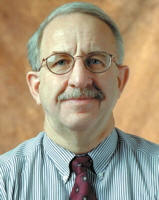
Dr. Richard Deth
Independent
Mercury
[pdf] Molecular Aspects of Thimerosal-induced Autism by Richard C. Deth, Ph.D.
Quotes
During these investigations, numerous scientists from around the globe have
testified before the Committee, and have presented credible peer-reviewed
research studies that indicated a direct link between the exposure of Mercury, a
widely known neurotoxin, and the increasing incidences of autism.
....Recently, credible researchers
from many of our Nation’s most highly regarded research universities have
published studies noting the possible associations between Mercury and health
defects.
Dr. Richard Deth, Professor at the
College of Pharmaceutical Studies at Northeastern University, was the lead
researcher in a collaboration between Johns Hopkins University, Tufts
University, the University of Nebraska, and Northeastern University on a
groundbreaking study into the possible correlation between increases in
environmental toxins such as thimerosal and incidences of autism. Dr.
Deth will testify on the findings and future implications of his research.
....Another innovative study was
conducted at Columbia University recently. Released in June of this year, the
researchers exposed mice to Thimerosal in doses and timing, which corresponds to
the current pediatric immunization schedule.
....The independent Columbia
University study indicates that subjects with a specific genetic susceptibility
toward autism are placed at a greater risk for neurodevelopmental diseases when
administered Thimerosal-containing vaccines. Unfortunately, Dr. Mady Hornig, the
lead researcher on this project, is unable to be with us this morning due to a
personal emergency. In her place, Dr. Deth will present her oral testimony.
....As many of us already know, the
incidences of autism have become increasingly prevalent in modern-day society.
Once considered a rare disease, effecting roughly 1 in 10,000 children, autism
now affects 1.5 Million of our Nation’s children, and this problem continues to
escalate rapidly.
....According to a recent “Autism
Alarm” released by the U.S. Department of Health and Human Services (HHS), the
Centers for Disease Control (CDC), and the American Academy of Pediatrics,
currently 1 out of every 6 children are diagnosed with a developmental disorder
and / or behavioral problem.
....Even more alarming, today 1 out
of every 166 children in the United States is being diagnosed with an Autism
Spectrum Disorder. This major healthcare crisis is clearly reaching epidemic
proportions, and will not just simply “go away.” Opening Statement of Chairman Dan
Burton 2004
Autism is a neurological disorder caused by dysfunctional metabolic control over methylation reactions, and thimerosal appears to be a precipitating causative factor in many cases. The methionione cycle and the trans-sulfuration pathway leading to cysteine and glutathione synthesis are abnormal in autism. Genetic polymorphisms, present in only a small subpopulation, represent risk factors for autism. As illustrated in Fig. 11, some of these genetic factors impair detoxification and clearance of heavy metals, including thimerosal, and also impair the capacity for methylation. Delayed clearance of thimerosal further impairs methylation, including both DNA methylation and dopamine-stimulated phospholipid methylation, adversely affecting growth factor-directed development and the capacity for attention, respectively. Autism can be treated, and some of the most effective treatments, such as methylcobalamin, act by improving methylation. This encouraging therapeutic development reinforces the conclusion that thimerosal does indeed cause autism, and it does this by interfering with methylcobalamin synthesis. This molecular understanding should lead to new and improved treatments for autism and should provide a scientifically sound basis for the removal of thimerosal from all vaccines. Testimony of Richard Deth, PhD; Bouve College of Health and Sciences; Dept. of Pharmaceutical Services; Northeastern University 2004